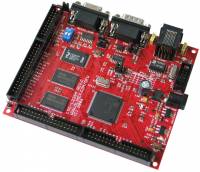Navigation
External Links
Donate
Show your appreciation for OpenBLT
and support future development by
donating.

External Links
Donate
Show your appreciation for OpenBLT
and support future development by
donating.

This is an old revision of the document!
| UART | CAN | USB | TCP/IP | SD-card |
|---|---|---|---|---|
| Yes | Yes | No | No | No |

This demo is targeted towards the Olimex LPC-L2294 board, with 1 MB external RAM and 2 MB external Flash EEPROM.
Please note that the board that was used for the demo had a modified external crystal oscillator of 20 MHz, instead of the standard 14.74 MHz crystal to allow for better matching CAN baudrate. If you use the 14.74 MHz crystal, please update configurable BOOT_CPU_XTAL_SPEED_KHZ in file “config.h”.
To program the bootloader into the internal flash on the LPC2294 microcontroller, the Segger J-Link JTAG interface was used. However, this is not required if you have another means of programming the internal flash.
To build the demo programs you can use the GNU ARM Embedded toolchain.
The demo programs are configured for building with a Makefile. Before attempting to perform a build, update the location of the toolchain binaries (i.e. arm-none-eabi-gcc) in the Makefile. It is set in variable TOOL_PATH. If the toolchain binaries are available on the path, then the TOOL_PATH variable can be left empty.

It is assumed that tools such as GNU make and rm are installed and available on the path. For (Ubuntu) Linux users this can be achieved by running command: sudo apt-get install build-essential. Windows users can install the GNU MCU Eclipse Windows Build Tools.
Before the bootloader can be used, it needs to be built and programmed into the LPC2294's internal flash memory. The steps in this section only need to be done once.
To build the bootloader, open a command prompt in directory \Target\Demo\ARM7_LPC2000_Olimex_LPC_L2294_GCC\Boot\ and run the command:
make clean all
The expected output is:
+++ Assembling [cstart.o] +++ Compiling [hooks.o] +++ Compiling [main.o] +++ Compiling [boot.o] ... +++ Linking [openblt_olimex_lpc_l2294_20mhz.elf] ... +++ Build complete [openblt_olimex_lpc_l2294_20mhz.srec]
The bootloader program is now ready to be programmed into the internal flash memory of the LPC2294. Using your favorite programmer, flash the bootloader using one of the following files, depending on what file type your programmer supports:
To build the user program, open a command prompt in directory \Target\Demo\ARM7_LPC2000_Olimex_LPC_L2294_GCC\Prog\ and run the command:
make clean all
The expected output is:
+++ Assembling [cstart.o] +++ Compiling [main.o] ... +++ Linking [demoprog_olimex_lpc_l2294_20mhz.elf] ... +++ Build complete [demoprog_olimex_lpc_l2294_20mhz.srec]
The output file is
To download the demo program \Target\Demo\ARM7_LPC2000_Olimex_LPC_L2294_GCC\Prog\bin\demoprog_olimex_lpc_l2294_20mhz.srec using the bootloader, follow the instructions in the following links, depending on the communication interface you intend to use:
The Olimex LPC-L2294 board has an additional 2MB of external Intel C3 flash. This demo includes support for programming this external flash EEPROM with the bootloader. This also demonstrates the hook function functionality through which additional memory devices can be supported in the bootloader. To enable programming of the external flash EEPROM, open “\Target\Demo\ARM7_LPC2000_Olimex_LPC_L2294_GCC\Boot\blt_conf.h” and change the value of BOOT_NVM_HOOKS_ENABLE:
#define BOOT_NVM_HOOKS_ENABLE (1)
After this, follow the steps outlined above, to rebuild and reprogram the bootloader and user program.